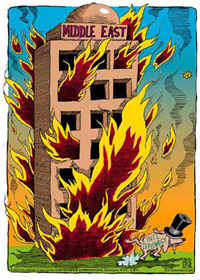The Middle East Forty Years After The Six Day War genre: Just Jihad

Clearly, the Middle East is a region with a complex history which continues to fuel much of the ongoing conflict. A new article by the San Francisco Chronicle offers a brief yet succinct recap of the region since the Six Day War...a war that shocked the Arab nations and began a long run of bitter disputes and impassioned violence. Despite Israel's tenacity and its capacity for self-defense, the past forty years have been difficult.
(06-03) 04:00 PDT Jerusalem -- Four decades after Israel's staggering military victory in the Six Day War, the peoples of the Middle East are still reeling from its aftershocks.
A new generation of leaders now governs the countries that fought in 1967, but not a single day has passed since that has not been dominated by its legacy, and the battle for peace remains unresolved 40 years later.
The Israeli conquest and subsequent occupation of the West Bank and Gaza Strip with their large Arab populations brought the young state of Israel state face to face with the paradox that had haunted the Zionist movement since its inception at the end of the 19th century: How could the desire to establish a Jewish state in the ancestral Jewish homeland mapped out in the Bible be reconciled with the future of the Palestinian Arabs who had been living in that same land for centuries?
Before June 5, 1967, Israel appeared to be a David facing a Goliath-like coalition of 22 Arab states sworn to its destruction. Six days later, Israel had emerged as a regional superpower, finally ending centuries of Jewish victimhood but forcing its leaders to confront the responsibilities of victory and military might.
For the Palestinians, still reeling from the "Naqba" -- the "catastrophe" of Israel's founding in 1948, which turned 600,000 Palestinians into refugees -- the Israeli victory galvanized Palestinian nationalism. The war's outcome convinced Palestinians that Arab leaders' promises were worthless, and they resolved to take charge of the struggle against Israel.
The Arab states whose forces had been shattered were shocked at their defeat, but it had a strangely calming effect on them. The previous decades had been riven with inter-Arab rivalry, coups and wars. The Egyptians had tried to assassinate King Hussein of Jordan 11 times. But after 1967, the vanquished governments stopped fighting each other and united in their opposition to Israel.
"Forty years later, we are still grappling with the outcome of this war," says historian Michael Oren, author of "Six Days of War" and a senior fellow at the Adelson Institute for Strategic Studies at the Shalem Center think tank in Jerusalem. "For statesmen and military leaders throughout the Middle East, the Six Day War has never really ended.
"All other developments since then, from the two Palestinian intifada uprisings, the Israeli settlements to the rise of Hamas, can all be traced back to these six very short, intense and fateful days," he says.
Israelis remain traumatized by the period before the war, when annihilation seemed likely. Many are unwilling to take risks for peace because they fear one mistake could destroy the state of Israel.
Palestinians remain spellbound by the war and its aftermath. They regard Israel as a superpower that should make the first move toward peace .
I've said it before and I still believe that had we focused as much energy on the creation of an independent Palestinian state as we did in our attempts to bring democracy to Iraq, the middle east would be a far more peaceful region, there would be fewer new terrorists, and much of the underlying animosity towards the U.S. would have already begun to wane.
Just to be clear, I do realize that men like Osama bin Laden would likely never moderate their hatred of the United States...but resolving the Palestinian issue would undermine his ability to recruit and likely lead to his eventual irrelevance.
Instead, since 9/11, our actions in Iraq under the Bush administration have laid the groundwork for a new generation of anti-American fanatics who will view the United States as an aggressor nation that cannot be trusted and that abandoned the efforts of prior administrations to position the U.S. as an honest broker of peace within the region.
Whether this can be undone remains to be seen. Nonetheless, I believe that if we rekindled and recommitted ourselves to a Palestinian solution, we would begin to reverse some of the damage created by the Bush administration's neoconservative agenda.
Post a comment